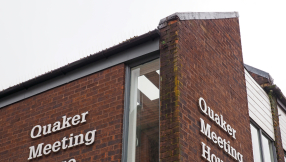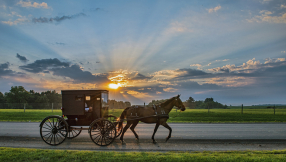
In many countries affected by the coronavirus churches are being closed, either on the advice or the order of government. In others they have not yet reached that stage and churches are being left to agonise over whether they should close or not. Many churches bowing to the inevitable have already announced the cancellation of their services 'until further notice'.
For some this is no big deal, but while I agree that there are good reasons for closing, and that we should follow government guidelines, we also need to be aware of the potential consequences. In the same way as some Christians are very blasé about 'social isolation', joking about it being like Christmas – a two-week holiday where we don't have to go to work and get to binge on Netflix and takeaway, others are equally blasé about church closures.
To them it's no big deal and indeed might be a welcome respite or an opportunity to try something new. We need to think a bit more deeply, rationally and biblically.
Why cancel church services?
It is the obvious, sensible and loving thing to do for most of us. Coronavirus is a flu-like illness that is in many instances beyond the containment phase and is now in the delay phase. In other words, the imperative is to prevent so many people all getting ill at once that the health services are overwhelmed. Although 80% of those who get it will have only a mild illness, others will be serious. Even if the death rate is 'only' 1% of those who get it (the latest estimate) – that is still ten times the death rate of normal seasonal flu. The death rate for the elderly with pre-existing conditions is far higher – 5-10%. So the key is to prevent as much contagion as possible.
Church services are where many people gather and where it would be possible for the virus to be transmitted to many people. When I was a minister in the Highland village of Brora, I remember the local doctor saying that I was his worst enemy – because I kept visiting the sick and thus became a source of transmission. Although he was half joking, we did then have a conversation about when it was and was not appropriate to visit, and the precautions that should be taken. In the case of coronavirus, surely closing churches will help limit social interaction and thus reduce the number of transmissions?
Some argue that meeting in church is not an essential to being the church. We can do 'virtual' church, do 'church at home' and meet in small groups (unless you're in Austria where the government has even banned groups of more than five people). There is no necessity to gather for public worship in a large building with a crowd of people. In fact this might be an exciting new way of doing church.
Why we should be concerned
Despite all the above, there are also good reasons for not closing unless we have to, and good reasons for being concerned if we do.
We need to consider carefully the cost of closing churches. Not the financial cost, but rather the psychological, emotional and spiritual costs to people. There are many people for whom the weekly gathering of the Lord's people is a real strength and community to them. The mental harm caused by the fear pandemic, and the constant 24/7 media and online hysteria should be factored in as well. And we must be very careful not to fuel the hysteria. One clergyman told me that we need to respond to the 'public vibe'. But when that vibe is basically panic I'm not sure that it is wise to be governed by that. We do not fear what they fear.
We need to ask if it really is the case that while hospitals, workplaces, shops and educational institutions are 'essential', churches are not? We dispense prayer, hope and the Word of God. We give people Christ. We also believe that human beings face a far greater danger than coronavirus. It is appointed unto men once to die and after that to face judgement (Hebrews 9:27). We are all going to die and we all need to be prepared for that. The Church is essential because while our society runs around in fear, we have good news of great joy – a Saviour for all the world. I suspect that if we give our people the message that we think gathering for worship on the Lord's Day is not 'essential' they will believe us. Indeed, many of them already do.
Ah, yes, comes the retort 'but we can have virtual church'. Virtual church is not church. Christianity was, is, and always will be incarnational. God so loved the world that he sent his actual Son, in the flesh. He did not send a video. I'm thankful that he did not send an emoij or a phone call – to the suffering, sick and dying.
It is incredible how physical Christianity is. The sacraments are physical sacraments (are we saying no more baptisms, communion for the next 12 months?). The very term 'ecclesia' means 'gathered assembly'. Where there is no gathering, is there a church? We are to 'greet one another with a holy kiss'. We give the right hand of fellowship. We sing together. Worship is physical....we stand, kneel, bow and even dance!
I'm also deeply concerned about the implications for evangelism and care for those who are not part of our church family. If our buildings are closed and we retreat into our groups, where can the frightened, questioning, lonely, seeking person turn to? Churches should be beacons of hope in a desert of darkness. Now is the time to let our light shine – not hide it under a bushel.
In that regard, I appreciate the Church of England's call to keep church buildings open so that people can go in and pray. We are going to have to think long and hard about how best we can reach out with the Gospel in the current circumstances. I'm not convinced that just adding further to the endless screeds of information and blessed thoughts on the Internet is really going to cut it.
Who needs preachers? Lectures can be delivered by video, entertainment shows can be delivered by video, business seminars can be delivered by video. Church cannot. I suspect that mega churches that do offer lectures, entertainment and business seminars can carry on 'virtually'. I doubt that any biblical church can. That does not mean that a shutdown is impossible – we do after all have to obey the government. Nor does it mean that it is sinful. But when we shut down, it is surely wise to make sure that there is an opportunity for real people to meet real people, in real time and in a real space.
Small groups may be the way to go – although I see some churches are also banning small groups and pastoral visitation, including to the bereaved. The good reason for that is to avoid spreading disease but I fear this is a pre-emptive response that will have wider consequences and does not take into account the effects of cutting people off from physical contact – especially those who need it the most.
Another big question for church leaders to consider: when are we going to re-open? And when we re-open, how will things have changed? This is not going to be a two-week thing. This could go on for 12 to 18 months. If any shutdown goes beyond a few weeks, then I would suggest that there will be significant mental, social and physical disorder in the wider community which will make the toilet roll fights seem as trivial as they sound. What will the Church do if that happens?
So what to do?
When we do close, we must not see this as an opportunity for us to take a wee holiday from 'church', but rather we should work twice as hard to pastor, lead, teach, preach, guide and pray. Let us open up our churches for prayer (with appropriate hand sanitiser and social distancing), visit the sick, watch out for the lonely and tell people of the great physician!
For some of us, not being able to travel, or take part in conferences or seminars, might actually be a great opportunity to reconnect with the local church. For some local churches, this could be a great opportunity to reconnect with their local communities. For all of us, it is a great opportunity to reconnect with our physical neighbours.
God is shaking up our world, reminding us of our mortality and opening up doors for us to proclaim the good news. The question is whether we believe that and whether we will have the insight and courage to walk through those doors.
David Robertson is director of Third Space in Sydney and blogs at www.theweeflea.com









